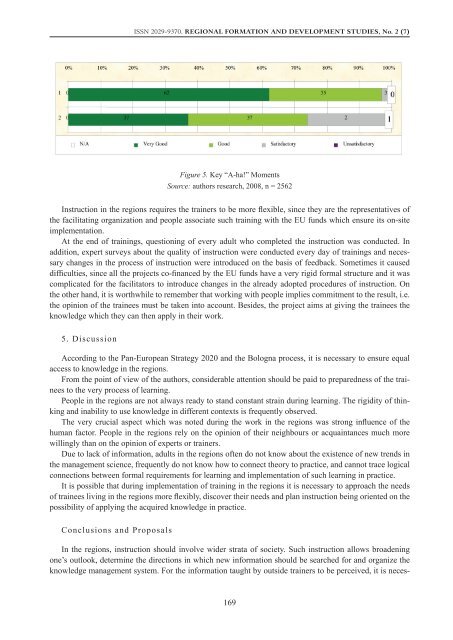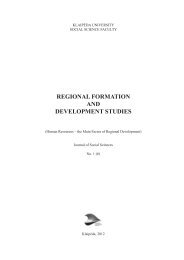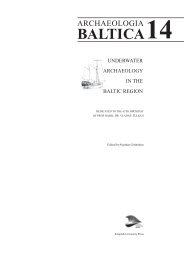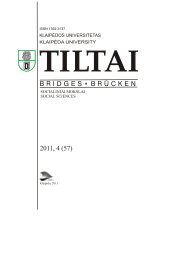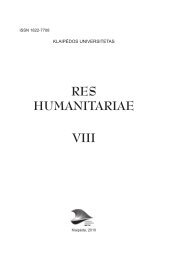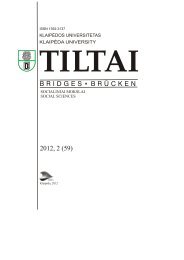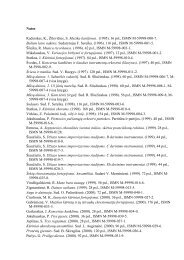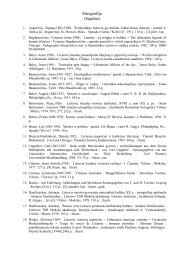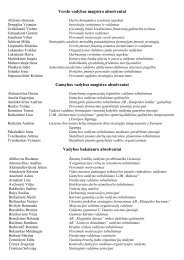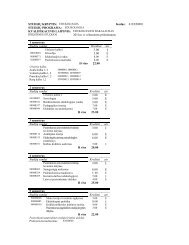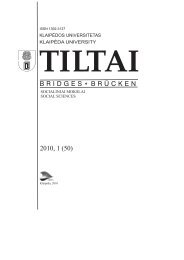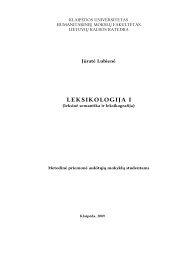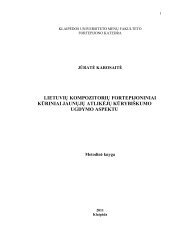regional formation and development studies - KlaipÄdos universitetas
regional formation and development studies - KlaipÄdos universitetas
regional formation and development studies - KlaipÄdos universitetas
Create successful ePaper yourself
Turn your PDF publications into a flip-book with our unique Google optimized e-Paper software.
ISSN 2029-9370. Regional Formation <strong>and</strong> Development Studies, No. 2 (7)<br />
Figure 5. Key “A-ha!” Moments<br />
Source: authors research, 2008, n = 2562<br />
Instruction in the regions requires the trainers to be more flexible, since they are the representatives of<br />
the facilitating organization <strong>and</strong> people associate such training with the EU funds which ensure its on-site<br />
implementation.<br />
At the end of trainings, questioning of every adult who completed the instruction was conducted. In<br />
addition, expert surveys about the quality of instruction were conducted every day of trainings <strong>and</strong> necessary<br />
changes in the process of instruction were introduced on the basis of feedback. Sometimes it caused<br />
difficulties, since all the projects co-financed by the EU funds have a very rigid formal structure <strong>and</strong> it was<br />
complicated for the facilitators to introduce changes in the already adopted procedures of instruction. On<br />
the other h<strong>and</strong>, it is worthwhile to remember that working with people implies commitment to the result, i.e.<br />
the opinion of the trainees must be taken into account. Besides, the project aims at giving the trainees the<br />
knowledge which they can then apply in their work.<br />
5. Discussion<br />
According to the Pan-European Strategy 2020 <strong>and</strong> the Bologna process, it is necessary to ensure equal<br />
access to knowledge in the regions.<br />
From the point of view of the authors, considerable attention should be paid to preparedness of the trainees<br />
to the very process of learning.<br />
People in the regions are not always ready to st<strong>and</strong> constant strain during learning. The rigidity of thinking<br />
<strong>and</strong> inability to use knowledge in different contexts is frequently observed.<br />
The very crucial aspect which was noted during the work in the regions was strong influence of the<br />
human factor. People in the regions rely on the opinion of their neighbours or acquaintances much more<br />
willingly than on the opinion of experts or trainers.<br />
Due to lack of in<strong>formation</strong>, adults in the regions often do not know about the existence of new trends in<br />
the management science, frequently do not know how to connect theory to practice, <strong>and</strong> cannot trace logical<br />
connections between formal requirements for learning <strong>and</strong> implementation of such learning in practice.<br />
It is possible that during implementation of training in the regions it is necessary to approach the needs<br />
of trainees living in the regions more flexibly, discover their needs <strong>and</strong> plan instruction being oriented on the<br />
possibility of applying the acquired knowledge in practice.<br />
Conclusions <strong>and</strong> Proposals<br />
In the regions, instruction should involve wider strata of society. Such instruction allows broadening<br />
one’s outlook, determine the directions in which new in<strong>formation</strong> should be searched for <strong>and</strong> organize the<br />
knowledge management system. For the in<strong>formation</strong> taught by outside trainers to be perceived, it is neces-<br />
169


